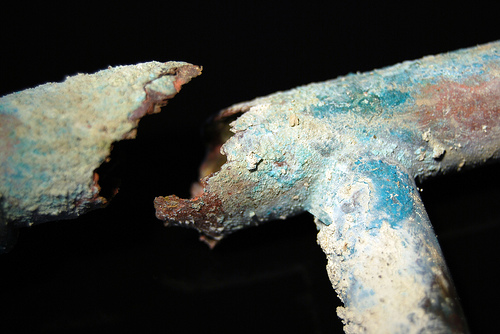It’s Friday and I’m miserable because my leg is in pain and gimped up, its damn cold and now, my condo is leaking. Yep. Of course it’s leaking, what else would it do on a Friday afternoon? I received the email shortly after 1pm. My helpful tenant remarked that “several litres” of water came out of the ceiling. All sorts of horror scenarios ran through my head – water damage, broken pipes, crazy neighbours… ANYTHING could be wrong!
Brian and I didn’t panic though. As part of being a landlord, you need to be prepared for emergencies like these. Even if you bought a brand new unit, there are always things that could go wrong. For example, your neighbour upstairs may have left the water running in a clogged up sink – new unit or not, that’s going to cost you time and money. Sometimes, appliances just stop working – you’ll need to repair or replace it.
So how do you prepare for unexpected little emergencies?

Photo Credit: Off beat Mum (http://www.flickr.com/photos/8007281@N08/3410850020/)
Have an emergency fund
The most obvious answer is often the easiest! Don’t wait until an emergency happens. Brian and I both have general purpose emergency funds of several thousand dollars. Everyone should consider building an emergency fund, and this is just one reason why they are handy. Several thousand dollars safely stashed away is more than enough to pay for a replacement appliance or plumber. We also contribute a small amount each month to a condo-specific maintenance fund. We use this amount for smaller issues, like fixing broken hinges or buying a new fan. Since we add to it every month, this condo-maintenance fund will hopefully one day be large enough to cover condo-related emergencies as well. We knew that if we needed to bring a plumber in ASAP, we’d be okay. We didn’t have to worry about whose “fault” it was or whether we would get reimbursed by strata.
Have adequate insurance
We have a basic homeowners insurance policy on our unit. This covers things like (certain) natural disasters or building-wide fire damage. Our building as a whole also has insurance on communal property. We also ensured that our tenants had adequate tenant insurance. It was a requirement prior to signing a lease. This covers the contents of the condo, such as their personal belongings and furniture, and it also covers emergency accommodation in the event that the unit was damaged beyond immediate repair. For example, if there was a catastrophic pipe leak which ruined the apartment, we would be covered for the structural repair and the tenants would be covered in terms of belongings and accommodation.
Have emergency contacts on hand
Our tenants know that in an emergency, they can contact the property management company. They also have our phone numbers and emails. If anything goes wrong, they know who they can contact for help and we hear about it very quickly. This ensures that small problems stay small. My parents had a tenant who never reported needed repairs for example. Instead of having to fix a small issue once every few months, they were stuck with fixing a mountain of issues after she moved out.
Brian headed over to the condo after dinner to investigate. So far, it doesn’t seem nearly as bad as it could have been. Thankfully, the leak was situated directly above the toilet so there was no floor damage at all. (It didn’t occur to the tenants to mention that??? *sigh* ) We’re not sure why there is a leak in the ceiling yet but we have a plumber coming in next week. Updates to follow!